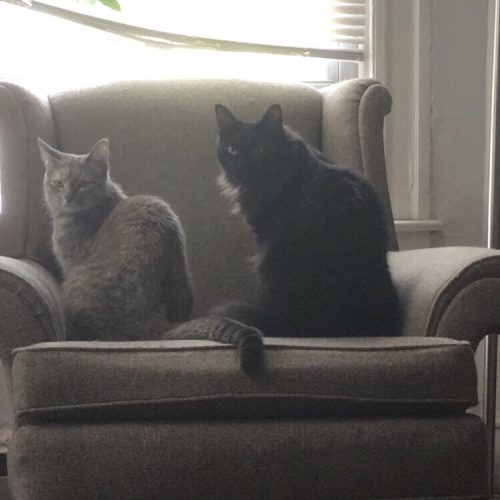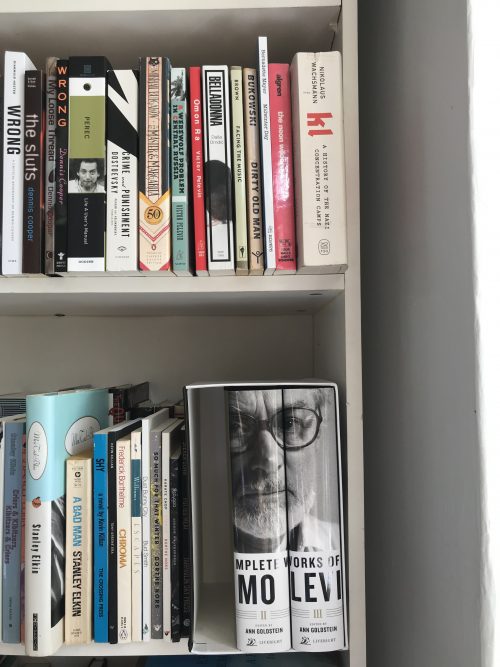The Story of My Cats as Told by My Cats

Our father is worried that if he lets us tell our story it will come out sounding like The Art of Racing in the Rain by Garth Stein.
He’s worried if he lets us tell our story it will read as cute and sappy and that the people of the internet will ridicule him for it.
But our father needs to get over himself and you, you ridiculous people, so do you.
We were born under a house next to a Food Lion grocery store in Hertford County, North Carolina.
This is what we are told, we don’t remember this.
We have different colored hair, one is gray and one is black.
We had a brother but he died in the cage with us after we were captured by a man in a truck and driven to a fenced-in facility where there were other people who looked like us, all in cages.
We were given ‘D’ names when we were brought to the facility.
Diesel, Delta, and Dax.
Dax is our brother who died.
We don’t remember our birth parents.
The person in the cage above us was old and alone and no one wanted to adopt her.
The facility smelled bad and there were holes in the floor taped over with duct tape.
Our adoptive parents visited us a couple of times before they chose to take us home.
And they changed our names from Delta and Diesel to Tammy Wynette and Possum because our mother likes country music.
We changed their names from adoptive mother and adoptive father to mother and father.
Our mother has blonde hair and blue eyes.
Our father has brown hair and hazel eyes.
He didn’t want to adopt us.
Our mother wanted us and so she made the decision.
But at first it was only going to be for a few weeks.
Our father picked us up and took us home because our mother was at her insurance-selling job she hated so much.
Our father worked part time at a pharmacy.
He always finds a way to work part time.
He brought us home and played with us and sat us on his belly.
We had dead fleas in our hair and feces on our faces and we were very small.
Our mother came home from work and played with us too.
She didn’t want to leave us alone.
One day she noticed we were sneezing and wheezing when we were breathing.
Our father wasn’t worried about it but our mother was worried and took us to the vet.
We had respiratory infections and were prescribed clavamox which was a pink fluid that they injected down our throats.
Our father said it smelled like bubble gum.
After a few weeks our mother spoke to our father about keeping us longer.
She wanted to completely adopt us.
He was hesitant.
They went to California—where our father grew up—for Thanksgiving, but they didn’t take us with them.
Instead, they drove us down the street to our mother’s mother’s house.
Our grandmother was larger than our mother and our mother was worried she’d give us too much food.
So before she flew away in an airplane, our mother told her mother not to overfeed us because she didn’t want us to get large too.
Our grandmother told our mother to relax and that she would follow all of our mother’s instructions.
Our parents had a big fight when they were in California and when they came home we could tell something was wrong.
They came from different backgrounds, our father grew up near a Whole Foods and our mother didn’t.
So they were mad at each other but then they were mad at our grandmother because when they came to pick us up our bellies were swollen and we couldn’t run or jump the way we like to.
This was because our grandmother fed us as much as we wanted.
She kept our bowls full when she left the house and she liked to give us treats.
Our mother was disappointed in our grandmother.
They took us home and it took a week or two but they resolved whatever problem they’d had with each other in California and our bellies grew smaller and we could jump onto the bed again and onto the kitchen counter.
But then our father didn’t love us.
That’s what he said to our mother one night when they lay in bed.
And that’s the correct usage of ‘lay.’
We know how difficult it can be to get that right, the “lay vs. lie” thing.
But our father cares about things like that, he pays attention to things that don’t matter.
Anyway, as we were saying, one night our father whispered that he didn’t think he loved us or cared about us.
It was after a day when we’d both stepped in our own mess in the litter box and tracked it around the house.
He hated the smell and we did too but we weren’t sure how to not step in our mess yet.
And whenever we stepped in our mess our father immediately undressed and grabbed us by the scruffs of our necks and got in the shower with us and washed our paws with warm water and a soap that smelled like coconuts and he held our butts up to the shower faucet.
So it was after one of those days.
And another problem was he’d read online about a parasite that lives in cat feces called toxoplasma gondii.
Toxoplasma gondii can make a person angry and suicidal and at the time our father was angry and suicidal and so he blamed it on our feces and, in turn, on us.
Every time he slammed a kitchen cabinet shut he thought it was because of a parasite in his brain and every time he felt like life was too much he thought it was because of a parasite in his brain.
And he didn’t love us or care about us.
Okay.
READ MORE >Places Where I Read Primo Levi’s If This is a Man

I bought The Complete Works of Primo Levi with unemployment money. It comes in a box and when the spines of the three volumes are put together they form the face of Primo Levi. When I am in my living room I can see Primo Levi and he watches me. We make eye contact. But I took the first volume out of the box and now he is missing a quarter of his face.
* * *
I am reading Levi’s first book, If This Is a Man, a memoir of his experience as an Italian Jew in Auschwitz. When the book was published in America it was given the title Survival in Auschwitz, a title almost as bad as Auschwitz for Dummies.
Put Auschwitz in the title or they won’t know it’s about Auschwitz, an editor must have said.
* * *
My great-bubby, Ethel Belgratsky, fled pogroms in what is now Ukraine long before the Holocaust and she lived in Montreal during the Second World War. But I don’t know what happened to the cousins and other relatives who never left. My Uncle’s wife’s mother survived the camps and fell in love with a Russian soldier. My grandfather—I call him Papa Howard—doesn’t know where our Novaks originate but the legend is that we are Lithuanian Jews. Litvaks. None of this is concrete to me. All of these people I never met swirl around in my head.
* * *
I like this book a lot. It is not a long book. I am reading it slowly because the sentences are rich and unique, simultaneously simple and complex, and the subject matter isn’t something I find myself able to breeze through. Every chapter is about life and death and pain and humiliation and hunger and thirst and hope and hopelessness and language and fear and the random stupidity of evil and innocence and cunning and chance and disease and excrement and chemistry and clothing and bowls and spoons and soup and bread and humor and fatigue and judgement and memory and war and almost no peace.
* * *
I read some of If This Is a Man on the blue couch in the living room in the morning. My back hurts. I don’t like our bed. Sometimes I sleep on this couch when I am sick of the way our bed is treating my back. It is winter and Primo Levi is in a crammed boxcar headed to Auschwitz. The men, women, children, and infants suffer “from thirst and cold.” Finally, after a long journey from Italy to Poland, the train stops. Primo and the woman who has been pressed against him for the entire journey, an acquaintance of his, say to each other “things that are not said among the living.” They say “farewell and it [i]s short; everybody s[ays] farewell to life through his neighbor.” Then the train car doors open and the men and women and children are separated by SS guards. The able-bodied men go one way and as for the women and children and old people, “the night swallow[s] them up, purely and simply.” The book is heavy in my hands. Each volume is a hardcover and Volume I is 747 pages long. IfThis Is a Man is the first book in Volume I and it ends on page 165. I am on page 16 and my eyes are wet after reading about a three-year-old named Emilia who had to be killed because she was a Jewish three-year-old. My hands and arms have to work to keep the book from falling onto my face.
READ MORE >